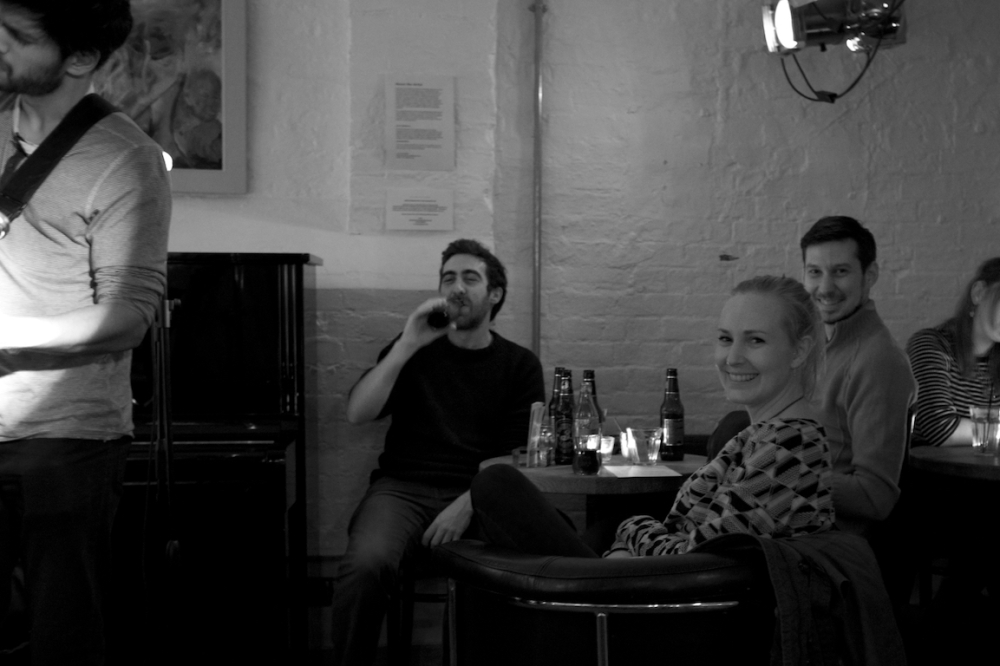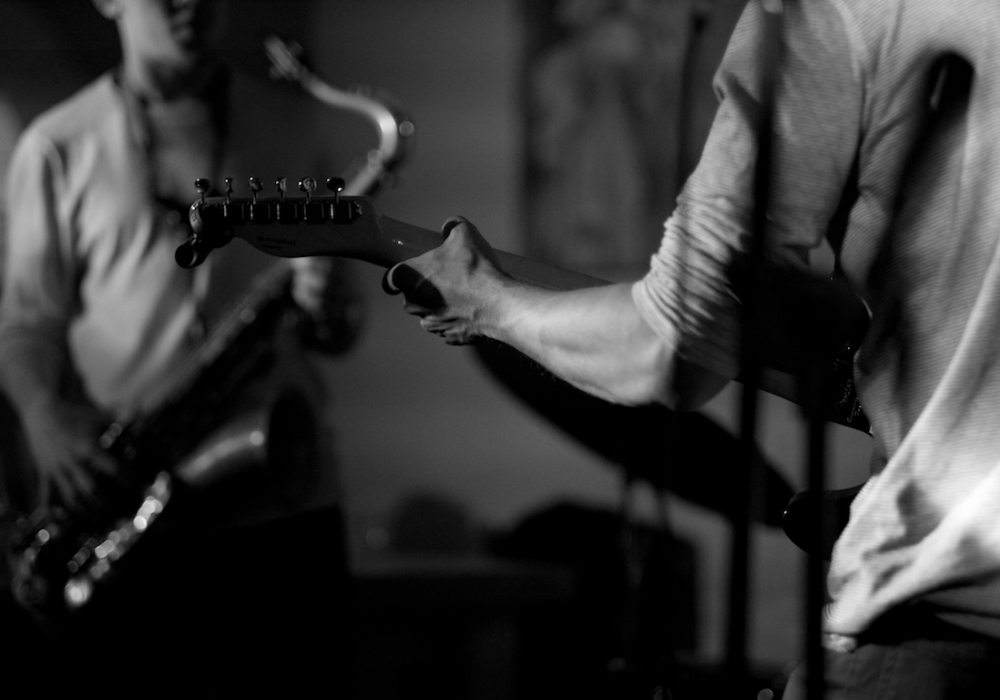JazzJanuary performance #4
Alex Hitchcock Quartet, Hot Numbers Coffee Shop, Cambridge, 14 January
JazzJanuary testers: Andréa, Jamie, Joff, Matt
JazzJanuary advisers: N/A
We’re halfway into JazzJanuary, and some things are looking clear. Whether they’re into jazz music or not, people will be impressed by a top-notch big band. Maybe they’ll be captivated by some nuance of melody, but if not, they’ll be knocked off their chair by the energy of it all. Either way, the music will make its mark.
Today’s performers don’t have the same options. There are only four of them. They’re in the corner of Hot Numbers Coffee Shop in Cambridge. There are no production people, no clever acoustic baffles on the ceiling, no stage, even. That said, it’s local to all four of tonight’s testers. ‘Cycling to the jazz’ is convenient, even if the phrase sounds a bit Liberal Democrat.
This is a weekly jazz night, hosted by drummer Mark Hale. There are no tickets, just a ‘suggested donation’ of £5 for the musicians. Happily – it’s 8pm – this friendly place sells beer as well as coffee.
If you’ve ever wondered what the Cambridge crowd of researchers does by night, they’re in here. With their laptops. Most are watching the band, but behind us, two women yibber and squawk. Doesn’t the lack of focus bother the musicians? “Not at all,” says Alex Hitchcock with a cheerful smile. “In the 1940’s, if an audience didn’t like a jazz band they would beat them up. So it’s really not that bad.”

Wine, candles, jazz, erm…laptops
The music’s not too intense. But, Mother of Gershwin, it’s tricky to follow! After a couple of minutes, you’re frustrated with trying to figure it out – though not with the sound itself. When was the last time someone stood right in front of you, playing saxophone to the standard of a Royal Academy of Music student like this? It’s quite beautiful. Drums, played on recorded pop songs in your car, are just dots of sound – bangs – like blips on a heart monitor. They serve to mark out points in time. They’re no different to parking receipts. Here, the drums sound not just live but alive. There’s a delicious woody resonance that could never quite be captured in a recording. It’s a good moment to remember some earlier advice from a musician: “Stop trying to figure it out. Just listen to it. Enjoy it.” Jazz-tester Joff is ahead of the game. “It’s great. When you listen to this music you can just empty your head. Stop thinking.”

Alex Hitchcock Quartet
The band is limbering up and finding a groove. It’s like watching a big cat on a wildlife documentary. Although it’s yawning and stretching, there’s a certain anticipation that it might be about to kill something. Jamie – who enjoys his music enough to build guitars for a living – is happy with this: “I love to hear a band playing within the limits…heavyweight players looking relaxed.”

Jazz-testers Jamie, Andréa, Joff
Then they play something called The Stars Fell on Alabama. It’s a jewel of a piece. The music is exquisite. Here’s your fiver’s-worth, easily. Andréa’s happy: her late grandfather used to play this with her on the piano. If you’re older than these musicians, ask to pre-book them now. They can play this while you’re on your deathbed. If it’s the last thing you hear, you’ll die smiling.
Guitarist Michael De Souza doesn’t mind our questions during the interval. Getting familiar with the more common pieces of jazz music – ‘standards’ – will mean you can follow it more often, he says. He gently points out that this goes for any music. For the players, it seems that self-indulgent solos are not seen as a sign of strength. “Everything we do, including our improvised playing, is meant to serve the music. If you’re focused on yourself – when you’re nervous, say – you’re not playing well. Your aim should be to understand the piece so well you’ve internalised it. Then, when you improvise, you’re listening to the rhythm section and playing for the music. When you completely forget about yourself…that’s when you’re playing well.”
This won’t be news to musicians. But it gives the rest of us a glimpse into the ‘bad jazz’ that’s scalded us in the past. Those wildly flamboyant solos sounded detached from the music because – guess what – they were. If a player takes to the stage with the aim of demonstrating his technical skills, he’s not doing it right.
Tonight’s a breakthrough in three ways. First: a proper jazz quartet can bring listening pleasure to normal people who are new to the music. Second, it seems that even bigger rewards might be available to those who do a bit of listening in preparation. Third, the Jazz-people are not closed and remote. They want you in. Ideally, they’d like everyone in.
Sometimes, when there’s a lot to think about, it’s good to have a bike ride home.
Highs:
1) Simon Read on double bass sounded “just awesome” according to jazz-tester Joff.
2) The Stars Fell on Alabama. A beautiful, delicate piece of music, played by experts, right under your nose, for a fiver.
3) The Jazz-people. Enthusiastic, tolerant, friendly. For the first time, we’ve encountered some above ground level (though we’ve still to see one in daylight).
Lows:
None reported.
Verdict:
Can there be a better use for £5 on a cold Thursday night in Cambridge?
Next up:
Ronnie Scott’s Jazz Orchestra (House Big Band), 17th January
Story and photos: Matt Pannell
